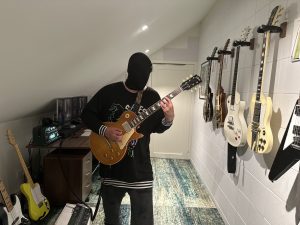When you own a band, you become your own personal creative director. You can have as lofty or modest a dream as you like. .While building your brand as a music artist involves mastering your craft and connecting with your audience, it’s also vital to establish a firm business foundation. In this regard, seeking the best llc service can help protect your creative assets and provide additional benefits such as tax flexibility and credibility in the industry. By combining your artistic talents with sound business strategies, you can propel your music career forward.
You can either keep things straightforward or develop a sizeable artist persona à la Ziggy Stardust. You can alter your brand at any time, ideally in a deliberate and considered manner.
Your brand’s objective is to increase public awareness of your music by creating recognition, a reputation, and a following. A brand ensures uniformity in your promotional materials and helps you advertise your music with intention.
It offers something that both your fans and members of the music business can latch onto. It also shows the latter that you’re serious about promoting your music and that you’re thinking about the business side of your art, even if you don’t want much to do with it. Besides the tips and tricks mentioned here, you can get good insights and info about live podcast on YouTube.
Where to start: Defining your message, setting goals, and identifying an audience
If your main objective is to spread your message to as many people as possible, the first step is to polish it until it becomes your unmistakable compass. Here are a few instances:
War, racism, corporate America, cultural imperialism, oppression by the government, the status quo, and capitalism were among the issues that Rage Against the Machine campaigned against.
In their works of art, Charlotte Adigéry and Bolis Pupul concentrate on issues such as political correctness, cultural appropriation, misogyny, racism, and social media vanity.
Electronic musician David Slowing uses his instrumental music to process life’s events and the emotions that go along with them (such as grief, for example), creating a soothing aural environment for others to process their own experiences.
All facets of your branding will reflect the message(s) conveyed through your music, from the clothing you wear to the fonts you select for marketing channels (social media posts, newsletters, posters, etc.). I’m not proposing that you alter your appearance better to represent your musical brand—quite the reverse.
Identifying your business goals
Every business needs goals to stay meaningfully engaged. After you’ve nailed your artistic statement, you’ll need to decide which markets will pay you the most for your work.
Consider posing the question: Why am I prepared to build my brand?
The answer to that question should indicate where you should concentrate your branding and marketing efforts. For instance, you could have to:
Create connections with music producers and trailer studios to establish yourself as a go-to composer.
Create a social media following that will use your bangers in their TikTok videos, propelling you to viral fame.
Establish your talent as a producer in order to attract the artist who will be your big break. So that you can concentrate on your art rather than fundraising and record sales, start contacting record labels to release and market your upcoming record.
Planning your brand
Voice and tone
Just as crucial to branding as your visual identity is the way you communicate with your audience. Your tone conveys your attitude and establishes what your followers can anticipate from you on the actual stage.
Assets
Make a list of your branding materials to begin creating an overall vision for your brand. Additionally, all of these will be included in your electronic press kit (EPK), which is a collection of materials that includes your biography, promotional images, press coverage, music, videos, etc. These will help contact record companies, publishers, brands, grant opportunities, and more in addition to the press.
Who to work with
By delegating, you can avoid feeling overwhelmed and have more time to polish your music project. Including others also gives you an “outsider’s” view of how the audience perceives your music.
If you do collaborate with others, look for those that share your goals and perspective. Try it out with anything like a Livestream or show poster to see how you all interact. Lacking the funds to hire someone?
Think about an equitable trade. If they’re a musician, perhaps you mix their CD in exchange. Or perhaps you work as a carpenter and can construct their ideal bookshelf. It’s working out great that I’m currently exchanging copywriting work for a logo for one of my side projects.
Recap: What you need to develop a brand
To make decisions, you must first and foremost be in a favourable situation. I generally mean mental space, but your surroundings might also need to be ideal. Think about purchasing a whiteboard or performing these exercises in your preferred space or coffee shop. When you’re prepared to start working, keep the following in mind:
Your Goals
Your Audience
Your Message
How will your music generate income?
The attitude you want to convey
The resources required to achieve your aims
The individuals who will aid you
Most importantly, make an effort to have fun!






